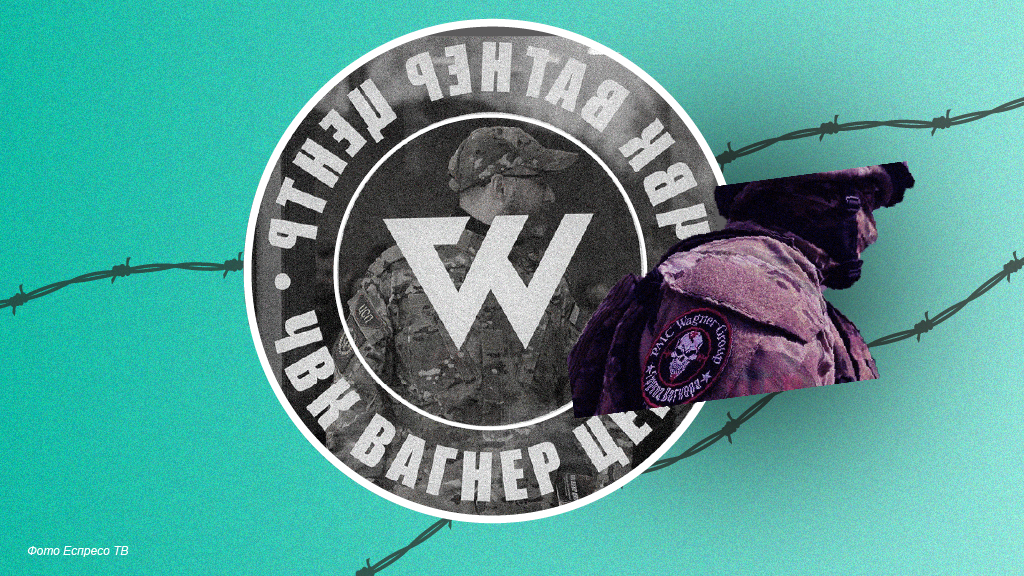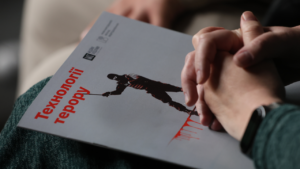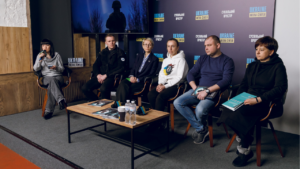Wagner Group. Why they are not mercenaries, and Russia is equally responsible for them like for its regular armed forces

“The Wagner group, a mercenary outfit that is better equipped than Russia’s regular army, fights in the first echelon.” This is a quotation from an article published in The Economist on December 15, 2022. It describes Wagner Group members, who are fighting against Ukraine, as mercenaries. This is a huge mistake. It is made by not only foreign, but also Ukrainian media, politicians, and government officials, creating the impression that the Wagner Group is sort of a separate entity unrelated to Russia and its military and political leaders. The Media Initiative for Human Rights has looked into why most Wagner members in Ukraine are not, and cannot be described as, mercenaries, and what role the USA and Russia play in this story.
What is the Wagner Group?
The Wagner Group is a Russian private military company (Wagner PMC) with a legal status not absolutely clear in Russia itself. Dmytro Utkin, a GRU Spetsnaz officer with the call sign Wagner, is considered to have founded it. However, according to many journalistic investigations, it is, in fact, owned by Yevgeny Prigozhin, an oligarch and a closest associate of Russian President Vladimir Putin. Since 2014, the Wagner Group has been involved in the war against Ukraine. Its members are nicknamed “musicians” and suspected of numerous war crimes.

Yevgeny Prigozhin, an oligarch close to Putin, founder of the Wagner Group (photo “Radio Svoboda”)
In September 2022, a video emerged online where a man who looked very much like Prigozhin was recruiting inmates of Corrective Colony No. 6 in the Republic of Mari El, Russian Federation, for the war against Ukraine. That same month, Prigozhin, who had previously denied involvement with the Wagner Group, admitted to creating it in 2014 and called the group members “the foundation of Russian patriotism.” Wagner PMC and Prigozhin are under US, UK, and EU sanctions.
On November 4, 2022, Wagner PMC Center was opened in Saint Petersburg, as announced by Yevgeny Prigozhin in October that year. According to him, the Center’s mission is to enhance Russia’s defense capabilities.

Central entrance to the Wagner PMC Center in Saint Petersburg ( photo “Ukrainska Pravda”)
Mercenaries or combatants?
So, are Wagner members mercenaries or not? The answer depends on two key factors, such as citizenship of the private military company’s members and the armed conflict they are involved in. International law makes it clear that only an individual that is not a citizen of a country involved in an armed conflict can be categorized as a mercenary. That is, under no circumstances can either citizens of Ukraine or citizens of Russia participating in the armed conflict between Russia and Ukraine be categorized as mercenaries. The side they are fighting for is irrelevant.
“Mercenaries are only people that are citizens of a third country. This is a key criterion,” stresses Maksym Tymochko, lawyer, partner of Umbrella JSC, a specialist in international law. “Other characteristics of a mercenary, including their desire to gain a personal benefit from participating in an armed conflict, are listed in Article 47 of Additional Protocol 1 to the Geneva Conventions, and in Article 447 of the Criminal Code of Ukraine.”
So, let’s make a mental note that only citizens of third countries fighting as part of the Wagner Group within Ukraine can be considered mercenaries. All others are combatants.

Chevron worn by the Wagner Group members (photo from Wikipedia)
On the other hand, foreign citizens officially fighting in the armed forces of a side of the armed conflict are legionaries rather than mercenaries. In the context of the Russian-Ukrainian war, this primarily concerns service members of the International Territorial Defense Legion of Ukraine, an active military unit that is subordinated to the Armed Forces of Ukraine and commanded exclusively by Ukrainian service members. “This is a key criterion for differentiating between legionaries and mercenaries, because, according to Article 47 of Additional Protocol 1 to the Geneva Conventions, an individual who is part of the armed forces of a party to a conflict may not be described as a mercenary,” says Andrii Yakovlev, managing partner at Umbrella JSC, analyst for MIHR.
So, what is the problem of determining the Wagner members’ status? There is no problem in legal terms. It only exists in the social and political plane, where the term “mercenary” is usually used very broadly and applied to all those fighting for money and not serving in the armed forces of a state involved in an armed conflict. “This is purely a game of words. We have household and political terms, and we have legal terms. In my practice, I use the legal [term] and believe that it should be correct,” says lawyer Tymochko.
Individual criminal responsibility of Wagner members
Regardless of the formal status of a participant in an armed conflict (service member of the regular army, a private military company, including Wagner, mercenary, civilian, etc.), they have individual criminal responsibility for an international crime, including a war crime. The same applies to the individual’s superiors and commanders. “Articles 86–87 of Additional Protocol No. 1 to the Geneva Conventions refer to the responsibility of commanders and superiors for their subordinates’ actions, if they fail to control them, know about breaches being committed, but fail to prevent them or do nothing to suppress them,” lawyer Andrii Yakovlev explains.
According to him, an investigation of international crimes should establish not only the specific perpetrator, but also the entire hierarchy of officials involved, where each must face individual responsibility.
But the question arises whether an individual’s participation per se in an armed conflict constitutes a crime. It does not under international law, but the national laws of many countries, including Russia and Ukraine, say that a mercenary participating in the conflict is committing a crime. Instead, combatants, those fighting within the armed forces of the conflict party, do not have criminal responsibility for participating in hostilities. When falling into the enemy’s hands, as Andrii Yakovlev emphasizes, they acquire the PoW status and cannot be tried for participation in hostilities, of course, if they have committed no war or other international crimes. Mercenaries are not entitled to the PoW or combatant status. “Unlike a combatant, a mercenary is not a legitimate participant in hostilities and, as such, can be tried on this count alone,” says lawyer Maksym Tymochko. “If, on top of that, they have committed a war crime, we additionally qualify them as a war criminal. On the other hand, the combatant’s immunity from criminal prosecution only applies to the extent of their participation in an armed conflict, but they will be tried for any violation of the laws and customs of war like any other war criminal.” All this applies to Wagner Group members.
Is Russia responsible for the Wagner Group’s actions?
A rule of international law states that, if a certain individual is an agent of the state, that is, they are authorized to operate, and actually operate, on behalf of the state, then this state is responsible for their actions. This primarily applies to officials, e.g. the president, the head of the government, the chief of the General Staff, the minister of defense, etc. The same rule applies to agents of the state who are not officials, but operate for the benefit of the state concerned. “Let’s take, for example, a Wagner member or a DNR fighter, who seemingly are not directly related to the Russian Federation as a state. However, they fulfill the obvious role and orders of the Russian command,” lawyer Maksym Tymochko explains. “That is, the state exercises effective control over the individual, which implies its responsibility.”
Lawyer Andrii Yakovlev develops the idea of Russian effective control over the Wagner members and their operation for the benefit of the Russian Federation by saying that, “It is irrelevant that Wagner PMC is an organization separate from Russian troops. It draws on their support— fire, artillery, planes, tanks. Who caused the Wagner members to emerge in the war zone? Obviously, it was Russia. They would not be there without its command’s permission. Besides, they get weapons from Russia and try to achieve goals set by this state—seize a certain area. That is, the Wagner Group is an agent of Russia, [the country] which bears international responsibility for its [the Group’s] actions.”
We should add that the Wagner Group operates in full coordination with regular Russian troops, holds the same positions as, and is de facto integrated into, the Russian Armed Forces. This is why the Wagner members are essentially, if not formally, a component of the Russian occupation forces and should be classified as such. To describe Wagner Group members fighting in Ukraine as mercenaries means to create a false impression for the public that they operate independently of the armed forces of the Russian Federation and are not under the control of the Russian military and political leaders.
No, they do not operate independently, and Russia has full international responsibility for them. “When calling this a private military company, calling them mercenaries, we create the impression that Russia has nothing to do with them. But we must call a spade a spade,” says lawyer Andrii Yakovlev. “These are only mental subtleties that will not matter in court. However, from the point of view of diplomacy, which greatly contributes to whether we get weapons, it is now important to clearly say that the Wagner members operate for the benefit of Russia. Because their artificial separation from the Russian Federation creates the need to demonstrate that they really operate for the benefit of Russia and that it is responsible for them. When we say that the Wagner Group is, essentially, Russian troops, this responsibility is presumed.”
USA in the Wagner Group’s story
On December 1, 2022, US Senator Roger Wicker, Rep., and Senator Ben Cardin, Dem., introduced a Congress bill to prosecute members of the Wagner Group. “The US should call this shadow army what it is: a foreign terrorist group. We must bring them to justice, along with all those who support them,” Wicker said. Cardin, the co-author of the bill and chair of the US Commission on Security and Cooperation in Europe, believes that recognizing Wagner members as terrorists will help bring human rights violators to justice.
“US recognition of the Wagner Group as a terrorist organization will pave the way to criminal prosecution of its fighters for the very participation in this organization, impose strict bans on any contacts with the Wagner Group. This will make it possible to seize their assets around the globe,” lawyer Maksym Tymochko explains.
Notably, according to Bloomberg, the administration of US President Joe Biden considers recognizing Wagner PMC as a foreign terrorist organization. But the final decision is yet to be made.
This article was prepared by the Media Initiative for Human Right supported by the Hela Sverige Skramlar for Ukraina project.
Stanislav Miroshnychenko, MIHR







